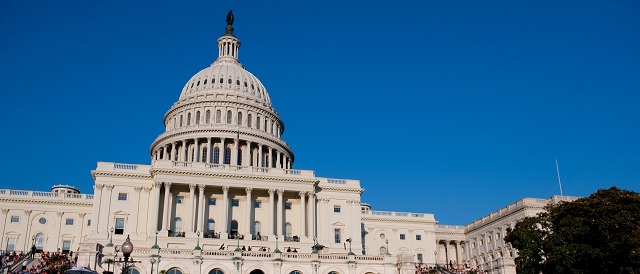By TERENCE P. JEFFREY
Suppose Russian President Vladimir Putin and Chinese President Xi Jinping made an agreement: All their personnel stationed in Washington, D.C., would vote for the same candidates running in Washington’s local elections.
How many votes would this hypothetical alliance deliver? Perhaps not many — but more than a few.
The New York Times reported last July that the number of Russians working at their D.C. embassy had dropped significantly.
“In recent years, as many as 1,200 Russian personnel worked in the embassy compound,” said the Times. “The State Department will not say how many remain — staffing levels here and at the U.S. Embassy in Moscow are now a sensitive topic — but in January 2022, Mr. [Anatoly] Antonov [the Russian ambassador] put the number at 184 diplomats and support staff members.”
The website of the Chinese Embassy in Washington does not appear to mention how many Chinese nationals are deployed there. But it does talk about the massive size of the embassy building. “It covers an area of 10,796 square meters with a floor area of 39,900 square meters,” it says.
So, how can the Chinese nationals who work there — for a communist government — get away with voting in an American election?
How can Russians, working at the direction of Putin, do the same?
The D.C. government enacted a law that allows it.
On Oct. 18, 2022, the D.C. Council voted 12 to 0 — with one member absent and not voting — to approve the Local Resident Voting Rights Amendment Act. Despite this one-sided vote, Mayor Muriel Bowser did not support it.
“Mayor Bowser expressed opposition by withholding her signature on the Act — something she has done only a handful of times over the course of her tenure,” said a report on the act published by the House Oversight and Accountability Committee.
The Washington Post also opposed it — in an editorial published a day before the Council vote.
“Voting is a foundational right of citizenship,” said the Post. “That’s why we oppose a bill, poised to pass the D.C. Council this week, that would allow an estimated 50,000 noncitizen residents to cast ballots in local elections.”
The Post also pointed out that this bill would allow both illegal aliens and foreign nationals working at foreign embassies to vote in D.C. elections.
“The proposal has been expanded to give voting rights in local elections to all noncitizen adults, regardless of whether they are in the country legally, so long as they’ve resided in the District for 30 days,” said the Post.
“There’s nothing in the measure,” the Post said, “to prevent employees at embassies of governments that are openly hostile to the United States from casting ballots.”
The House committee report repeated these points.
“On November 21, 2022, the District government enacted the Local Resident Voting Rights Amendment Act … which allows noncitizens, including illegal immigrants, to vote in D.C. local elections,” said the report. “The Act makes no exception for foreign diplomats or agents voting in the District. These individuals often have interests separate from, or opposed to, the interests of Americans. This D.C. Act dilutes the votes of American citizens and could have a ripple effect across other large U.S. cities.”
The D.C. Board of Elections has posted online instructions for how foreign nationals can vote in D.C. elections.
“Starting in 2024, qualified non-citizen District of Columbia residents may vote in local elections,” say the instructions.
“Specifically, under District of Columbia law, non-citizen residents may vote in District of Columbia elections held for the offices of Mayor, Attorney General, member(s) of the DC Council, member(s) of the State Board of Education, or Advisory Neighborhood Commissioner(s), or to vote on initiative, referendum, recall, or charter amendment measures that appear on District of Columbia ballots,” say the instructions.
“Non-citizens cannot vote for federal offices,” they warn.
In its editorial opposing the bill, The Washington Post had made a key point about this last provision.
“The U.S. Constitution does not explicitly prohibit what the D.C. bill seeks to do, but a law signed in 1996 by President Bill Clinton bans noncitizens from voting in federal contests,” said the Post. “The proposed law presents logistical nightmares that will require the Board of Elections to print separate ballots so that noncitizens don’t vote in federal races.”
Republican Rep. James Comer of Kentucky introduced a resolution in January 2023 to nullify this D.C. voting law. When it came up for a vote on Feb. 9, 2023, then-House Speaker Kevin McCarthy spoke in support of it.
“Last year, Washington, D.C., passed a law that would give the vote to illegal immigrants,” McCarthy said on the House floor. “The law makes no exceptions for foreign diplomats or agents who have interests that are the opposite of ours. Under this bill, Russian diplomats would get a vote and Chinese diplomats could get a vote.
“The CCP is already infiltrating our culture, our farmland, and our skies,” said McCarthy, “but the D.C. council would let them infiltrate our ballot boxes.”
The resolution to nullify this D.C. law passed the House 260-162 — with 42 Democrats joining 218 Republicans.
But it went nowhere in the Senate.
On May 23, the House again approved a bill to stop noncitizens from voting in D.C. elections. This time the vote was 262 to 143 — with 52 Democrats voting for it.
Yet, this week, our nation’s capital had its first local primary election where Russian and Chinese agents could legally vote.
Terence P. Jeffrey is the investigative editor of the Daily Caller News Foundation. To find out more about Terence P. Jeffrey and read features by other Creators Syndicate writers and cartoonists, visit the Creators Syndicate website at www.creators.com.

















